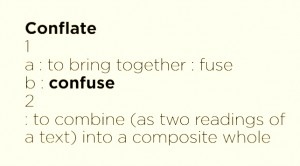 In an article published in CBCP for Life, Bishop Broderick Pabillo said that the “church hierarchy is entitled to speak and express its opinion on public policies that could affect the welfare of the majority.”
In an article published in CBCP for Life, Bishop Broderick Pabillo said that the “church hierarchy is entitled to speak and express its opinion on public policies that could affect the welfare of the majority.”
I don’t see anything wrong with this statement. Nor should anyone. What I don’t like is how the article says that this obvious sentiment — that the clergy can criticize the government — somehow “settles the debates pertaining to the constitutional provision on the separation of the church and state.”
What the bishop has done is conflate disallowing criticism of the government with enforcing secularism. Throughout the article, both Pabillo and the writer quoting the bishop make it seem as if secularism asks the Church to keep silent on political matters:
Again, no one is asking the clergy to end their criticism because it is proscribed by secularism. This is not what the public debate on secularism is about.
What secularism advocates ask for is not Church silence but government neutrality. A Church leader, like any other Filipino citizen, is free to say whatever he wants about politicians or policies, however religious or theocratic it sounds.
But if secularism is to be respected, public officials must not do the same. Their words and actions must be secularly motivated — motivations do not privilege one religion above others — or at least appear to be.
What this means is that a public official is not prevented from being motivated by religious convictions whenever they fulfill public duties. But they owe the public — which may or may not share their private convictions — secular justifications for their political actions. “Because my bishop/Bible says so” will no longer do.
This is why many conservative politicians must now resort to secular arguments — based on non-religious reasoning and supposedly scientific evidence — to further their religious agenda.
Although the motivations of these arguments are primarily religious — which is often evident in how little reason and science are actually involved — they can at least be debated legislatively, countered with other secular arguments, and tethered to consequences in the real world that all citizens can appreciate, regardless of religious affiliation.
That politicians make an honest effort to behave politically as though they had no religious bias: This is really all that secularism requires. Unfortunately, many politicians still act like sectarian Church preachers intstead of secular public servants.
This patent sectarianism is really what secularists want to correct. By making it seem like secularists are instead asking to silence the Church, Bishop Pabillo and the article writer cast not only secularists but secularism itself in a bad light.
Pabillo (and the article writer) hasn’t settled any debate on secularism. But he has started a small one in my mind: Either Pabillo doesn’t understand secularism, or he doesn’t want others to.


Indeed, the Church can say whatever she wants, and in doing so, enters the arena of public discourse which is rich with ideas opposed to church thinking and even the insults that go along with objection. If the CBCP priests believe it is their calling to condemn half of their flock for wanting women to have the power of choice, they bear accountability for that stand. And the flock leaving for other churches. They can't both criticize and then hold themselves apart as protected from criticism because they are of their particular (I almost typed "peculiar") God.